Pushing the Frontiers of Science and Impact in Early Childhood to Scale

For people currently working in early childhood, the time when we did not understand the importance of the first five years of life may seem like a distant past. We now recite with ease the criticality of a child’s earliest years as establishing the foundation for the rest of one’s life, creating the base for success in education, career, and relationships. We also understand the adverse effects when a young child develops in the absence of loving, supportive caregivers in an environment of “toxic stress”.
Much of what we know today has been built over the past 20 to 30 years thanks to scientists, researchers, philanthropists, governments, advocates, and strategic communicators who have brought all of this knowledge into the public domain.
One of the most important leaders and contributors of that knowledge is the Center on the Developing Child at Harvard University(HCDC), thanks to the leadership of Jack Shonkoff, M.D. Not only has HCDC changed the conversation about early childhood on a global scale, they have been instrumental in developing the scientific evidence demonstrating the effects of adverse experiences on young children, as well as working to inform new policy and practice approaches in the early childhood ecosystem.
While we have much to celebrate about the last 20 years of progress, we still have much work to do. Today, there are nearly six million children under age five in the US who are at risk of entering kindergarten without this solid foundation; the figure worldwide is nearly 200 million. That represents an enormous need for new understanding about the nature of the problem along with new approaches that can provide these millions of children with the opportunity they deserve to lead fulfilling and flourishing lives.

The Role of Evidence-Based Programs
HCDC’s research is wide-ranging and includes areas like brain architecture, executive functioning, and resilience — the ability of a child to overcome a serious hardship. HCDC’s work has created such a strong foundation for the field that they are responsible for coining terms like “toxic stress” and “serve and return” that have changed the way that people think about child development and a child’s interactions with the adults in their lives. In recent years, the Center has deepened their work by searching for biomarkers that indicate the effects of stress in a child’s environment in children as young as two months old, and the subsequent effect of that stress on brain development, the immune system, the cardiovascular system, and more. These biomarkers have game-changing potential in helping to identify early what kinds of targeted interventions are needed for which children, and to measure what works best and least for whom, in a significantly faster way than we have ever seen.
HCDC’s work has created such a strong foundation for the field that they have coined terms like “toxic stress” and “serve and return” that have changed the way that people think about child development.
HCDC doesn’t stop with research; the ultimate goal is to apply those learnings to create a new generation of evidence-based practices for more effective intervention. The work extends beyond the children themselves to the creation of practical programs for parents and caregivers, pediatricians and educators, and other adults in a child’s life. The Center also works to develop methodologies to measure and improve the effectiveness and impact of these programs. When programs work in an interconnected way, are clear about how they work (and for whom), and can measure their impact quickly, it will create an environment in which all children have a better opportunity to thrive.
When programs work in an interconnected way, are clear about how they work, and can measure their impact quickly, it will create an environment in which all children have a better opportunity to thrive.
On the Frontier
In 2011, HCDC created a unique research and development platform called Frontiers of Innovation(FOI), aimed at bringing together individuals from all areas of the early childhood development ecosystem to develop “more effective strategies to catalyze breakthrough impacts on the development and lifelong health of young children and families experiencing significant adversity.” While difficult in execution, the mission is simple — to apply the best of what we know from science in real, practical ways to create impactful solutions, and to scale that impact to as many children and families as possible. The initiative has developed and supported a range of programs aimed at helping schools, community groups, and caregivers at home.

One high-impact intervention participating in FOI is MOMS (Mental Health Outreach for Mothers) Partnership. MOMS addresses the mental health needs of lower income mothers in at-risk communities, where the high levels of stress and isolation they experience can impact their ability to create a responsive, supportive environment for their child. That means their young children run a higher risk of adverse outcomes.
MOMS engages mothers in the community as mental health “ambassadors” to their peers to connect them to service providers who can help mothers obtain support, basic necessities like diapers, stress management classes, and even help them establish a strong social network. So far, the program has served more than 1,000 mothers in Connecticut, and their impact has been impressive. 76 percent of mothers have shown a decrease in depressive symptoms, 67 percent have a decrease in parenting stress, and children of participants attend six more days of school per year compared to children of non-participants.
MOMS is now working with FOI, among other government and philanthropic partners, to develop a scalable model for expanding their work to new cities and states.
“Our partnership with FOI allows us to not only connect to a community of thinkers and doers from which we can derive input and advice, but also connect to a network focused on achieving outcomes at scale. The FOI network brings together scientists and leaders from business and industry who think broadly about scaling solutions and inventions. This transdisciplinary approach is rare and also critical to advancing the field in a way that brings about meaningful and measurable impacts on the lives of families.” — Dr. Megan Smith, Founder and Director, MOMS Partnership
Investing to Bring Ideas to Scale
With programs such as MOMS, HCDC has taken on the challenge of moving programs based on its core ideas from pilots to scale. At the same time, HCDC has recognized that the work of building organizations that scale require their own special set of skills and talents and has actively worked to partner with organizations who support entrepreneurs designing for scale, such as the newly formed Promise Venture Studio. HCDC brings its unique ability to embed science and precision design methods to ensure that while scaling, a program or product is delivering impact and continuing to iterate and improve on that impact.
Our US education team is excited to partner with HCDC to bring their work to scale. At Omidyar Network, we are focused on increasing kindergarten readiness in the US with ambitious goals about what’s possible. We know this won’t be achieved through increasing scale alone, and it won’t be achieved through improving impact alone. In order to reach our goals to ensure that all children enter kindergarten healthy and ready to learn, we must have both working together.
We’re excited to partner with HCDC as they continue to push the frontiers of both the science and evidence in early childhood while also driving the narrative on the importance of scale, knowing that all of our goals will only truly be recognized by ensuring we reach all children and families, particularly those who need the most support, to reach their full potential to flourish.
If you are building a solution seeking to help young children and their families thrive, you can experience the next Frontiers of Innovation one-day workshop on November 28, 2018. Learn more and register here.